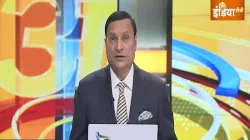OPINION | Should there be reservation for Muslims on religious grounds?
Both Prime Minister Narendra Modi and UP chief minister Yogi Adityanath, in their election rallies on Friday, alleged that the Congress wants to implement 'Shariat' (Muslim personal laws) in the country and reduce quotas for SC, ST and OBCs in order to give reservation to Muslims.

With Calcutta High Court nullifying all OBC certificates issued by West Bengal government between 2010 and 2024, and Chief Minister Mamata Banerjee preparing to challenge the verdict in the apex court after summer vacation, the issue of reservation, particularly for minorities, has taken centrestage in the current general elections. Both Prime Minister Narendra Modi and UP chief minister Yogi Adityanath, in their election rallies on Friday, alleged that the Congress wants to implement 'Shariat' (Muslim personal laws) in the country and reduce quotas for SC, ST and OBCs in order to give reservation to Muslims. Yogi Adityanath even alleged that the Congress and INDI alliance parties want to implement Taliban laws by asking women to come out of their homes wearing 'burqa'. Addressing rallies in Jharkhand and Bihar, Home Minister Amit Shah alleged that Muslim reservation is on the top of the agenda of Congress and INDI alliance parties. "They tried to implement Muslim reservation in Bengal, but the High Court nullified their measures," Amit Shah said. In reply, Mamata Banerjee vowed to continue reservation for "Backward Muslim castes". Samajwadi Party leader Dharmendra Yadav said, there was no harm in giving reservation to Muslims, while Nationalist Congress Party founder Sharad Pawar claimed that he had given reservation to Muslims in Maharashtra nearly 20 years ago. On his part, Prime Minister Modi pledged that his government would implement uniform civil code and Citizenship Amendment Act during his third term.
Union Minister Giriraj Singh emphatically said, there is no provision in the Constitution for providing reservation on grounds of religion, and hence, all reservations given to backward Muslim castes must end. "Hindus", he said, "must unite, otherwise INDIA alliance parties will convert Bharat into another Pakistan". The Muslim reservation issue has cropped up on the eve of the last two rounds of polling. This has been evident mostly in Muslim-dominated constituencies like Azamgarh. Samajwadi Party candidate in Azamgarh, Dharmendra Yadav is openly supporting Muslim reservation. As far as Sharad Pawar is concerned, polling is already over in all Maharashtra constituencies. Pawar was silent on Muslim reservation issue till the time voting in Maharashtra was going on. Pawar knows that since all the votes have been cast in Maharashtra, raising the issue of Muslim reservation will not harm his alliance's prospects in Maharashtra, where Maratha reservation seems to be a bigger issue. In Bengal, Chief Minister Mamata Banerjee has vowed to continue with Muslim reservation, and challenge the Calcutta High Court verdict that struck down the OBC list, describing it as "unlawful".
Out of a total of 42 Lok Sabha seats in West Bengal, votes have already been cast in 25 constituencies, and polling remains in 17 seats. The eight constituencies that went to polls on Saturday were earlier Mamata Banerjee's strongholds, but in 2019, her party had lost five of them to BJP. Mamata wants to stop BJP's advance in Bengal at all costs by consolidating her Muslim vote banks. The political faultlines in Bengal have now been clearly demarcated between Modi and Mamata. The Trinamool chief wants to keep her Muslim vote banks intact, and she has even gone to the extent of blaming NGOs like Ramakrishna Mission and Bharat Sevashram Sangha as working for BJP. On the other hand, Modi has vowed to oppose reservation for Muslims. BJP leaders in Bengal have gone to town, telling voters how Mamata government tried to prevent Durga idol immersions in order to allow Muharram tazia processions.
Aaj Ki Baat: Monday to Friday, 9:00 pm
India's Number One and most followed Super Prime Time News Show 'Aaj Ki Baat- Rajat Sharma Ke Saath' was launched just before the 2014 General Elections. Since its inception, the show has redefined India's super-prime time and is numerically far ahead of its contemporaries.

